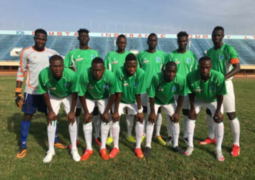
The meeting will take place on 16 and 17 June 2016 at the Kairaba Beach Hotel.
Speaking in an interview with this paper at Kairaba Beach Hotel on Tuesday, Mr Dieye said the meeting as it will enable stakeholders to come together to discuss is important pertinent issues prior to the 6th TICAD-VI summit to be held in Nairobi, Kenya, in August this year.
According to Dieye, the Banjul meeting, which is expected to bring together about 800 participants from across the world, was organised by the Gambia government and Japan, in association with the United Nations Development Programme (UNDP), the United Nations Office of the Special Adviser on Africa, the World Bank and the African Union Commission, to discuss important issues prior to the TICAD-VI Nairobi summit.
‘”This is the first time of having TICAD in Africa,” he said, adding that he was delighted at starting the event in The Gambia.
“I hope that the positive spirit of Banjul will guide us throughout the meeting,” he said.
Neneh Macdouall Gaye, Minister of Foreign Affairs, in her remarks, said The Gambia has strong relations with the co-organisers of the event, and hoped that the meeting would strengthen the existing bilateral relations.
“Preparation for the event has gone perfectly as far as planning is concerned, and I am confident that it will be successful, by the grace of Allah,” she said.
According to reliable sources, prior to the TICAD VI Ministerial Preparatory Meeting in Banjul, a TICAD preparatory senior officials meeting was held in Djibouti, on 14 and 15 March 2016.That meeting was attended by hundreds of participants from 115 countries and international organizations, including 44 delegations from African countries, representatives of partner countries, international, regional and sub-regional organizations, and civil societies in Africa and Japan, as well as NGOs.
The meeting welcomed the progress made in the implementation of the TICAD V Yokohama Action Plan 2013-2017 and discussed Africa’s development agenda to be addressed at the first-ever TICAD Summit to be held in Africa.
However, the Yokohama (TICAD V) declaration and its five-year Yokohama Action Plan remains valid and under implementation until 2018.
There was a wide consensus among participants that TICAD VI should reflect on new developments in Africa and in the international community since TICAD V ensured synergy and complementarity with Agenda 2063 and its First Ten Year Implementation Plan, the Sustainable Development Goals (SDGs), the COP 21 and so on, and provide key perspectives to further advance Africa’s development agenda.Against these backdrops, participants discussed such themes as economic diversification and industrialization, resilient health systems for quality of life, and social stability for shared prosperity.
Reconfirming the TICAD principle of African ownership and international partnership, participants agreed to continue to work closely towards the TICAD VI Preparatory Meeting at Ministerial Level, (to be held in Banjul, The Gambia, on 16 and 17 June 2016) and the TICAD VI (in Nairobi, Kenya, on 27 and 28 August 2016).
“We affirm the alignment of TICAD VI to Agenda 2063 and its First TEN Year Implementation Plan and Member States’ related development plans and strategic priorities.”
Based on the need to address the three challenges and international development priorities mentioned, three pillars have been identified:
Pillar 1: promoting structural economic transformation through economic diversification and industrialization; Pillar 2: promoting resilient health systems for improved quality of life; and Pillar 3: promoting social stability for shared prosperity.
In order to ensure the achievement of quality results within the framework of the partnership, the TICAD process has a follow-up mechanism, as well as robust monitoring and reporting systems.
There is a Joint Secretariat, a Joint Monitoring Committee and a TICAD Follow-up Mechanism.




